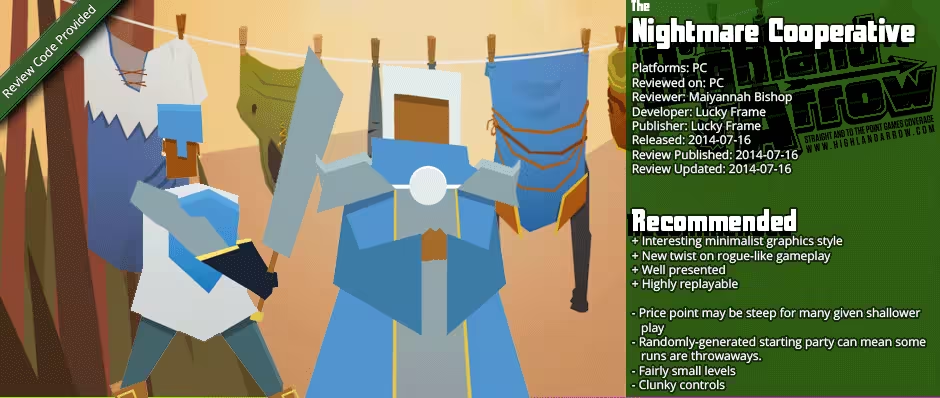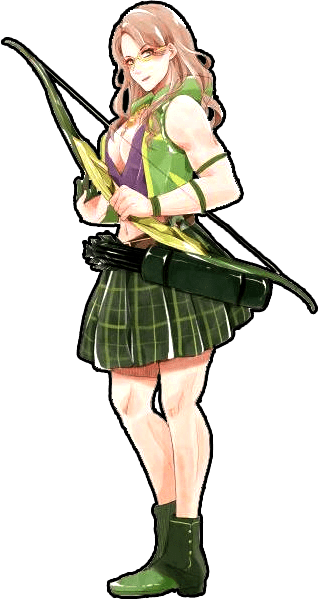

Editor's Note: This review was written using a review copy of The Nightmare Cooperative provided at no charge by Lucky Frame.
The Nightmare Cooperative is a casual rogue-lite game developed and published by the UK-based Lucky Frame. It has a clean and nice minimalist style and some interesting if shallow rogue-lite elements but with how many rogue-like games are available in the market, the question becomes: does it stand out?
That minimalist art style is no doubt
the first thing one notices
The general presentation of the game has had a LOT of obvious work done on it. It looks and feels pretty good, with a solid art style and decent sound direction. The sounds are all good audio cues and the soundtrack is quite thematic. While that minimalistic art style is something that one can take or leave and is mostly something of subjective preference, it's hard to deny that it's a solid implementation of that style.
The game is made in Unity if the launcher is any indication, and while the launcher does offer the ability to change resolutions prior to launch, it would be preferable if you could change resolution and graphics options from within the game. I've seen Unity games do this so I know its possible. Not a huge deal by any means, but something that should be there in a PC release, in my opinion.
Game mechanics are simple but offer an interesting twist
The game offers the standard rogue-like mechanics: enemies move only when you do. You walk into enemies to fight them, you each get a strike unless you have special abilities, and there are pickups for health and mana as well as gold. That much is well-done but bog-standard; the twist comes in the fact that you will have a party that follows your lead character and you do not have direct control over them, instead having to work your way about in interesting ways to manage positioning: the party all moves in the direction your decide, every time you do. So you have to consider not just your lead character, but where this takes your whole party, adding a definite angle of a puzzle or more tactical game to the typical formula.
There's a couple other flourishes: a timer in each level will constantly tick down to the next spawn of an enemy, so you can't just clear a level and loot everything (though the levels are pretty small so I never found that a huge problem), and you can recruit additional party members by finding them in the dungeon and recovering them.
This becomes furthermore a little more complex in that each of the different characters has their own special ability that they can use: there's a cleric character that can heal, the barbarian can knock enemies back, and so forth. It makes that positioning all the more important as you will want to have everyone in the optimal position to be able to use their abilities.
The need for careful positioning highlights
the control issues of the game
There's kind of two main complaints here when it comes to the controls. One of them is small and preference. The other .. not so much. First of all, I found the game would require the cursor keys for movement rather than WASD; so okay a constant little frustration I have to temper, not so bad right? Well, you're right - that's mostly preference and habit more than anything else.
The more important control issue revolves around the special abilities: you have limited uses of them, controlled by how many mana potion pickups you get (the blue potions) and when you have multiple party members you can't select which one to use - all of them will use their ability. There's an argument to be made for that being part of the difficulty of the game - but when the difficulty of a game comes from a lack of control, that's inherently unfair difficulty.
The ability to not move diagonally is a tangential point as well: its notable, but doesn't affect difficulty since the game is built around four-directional movement. It does lead to many situations where you can't safely get to an item or companion member as a result, however.
Procedural generation adds replay but also problems
That sounds like the central complaint to many a rogue-like, and it is. The Nightmare Cooperative's big problem in this regard is that your starting party of two adventurers is randomly generated from two of the ones you've unlocked thusfar and they are not made equal. You can have runs where you might as well suicide and start over again because the combo just won't work, and it's hard to escape the feeling in that circumstance that the game is wasting your time in those situations. It's not the biggest complaint however, as people accustomed to rogue-like games are not doubt quite used to that being a part of the game.


